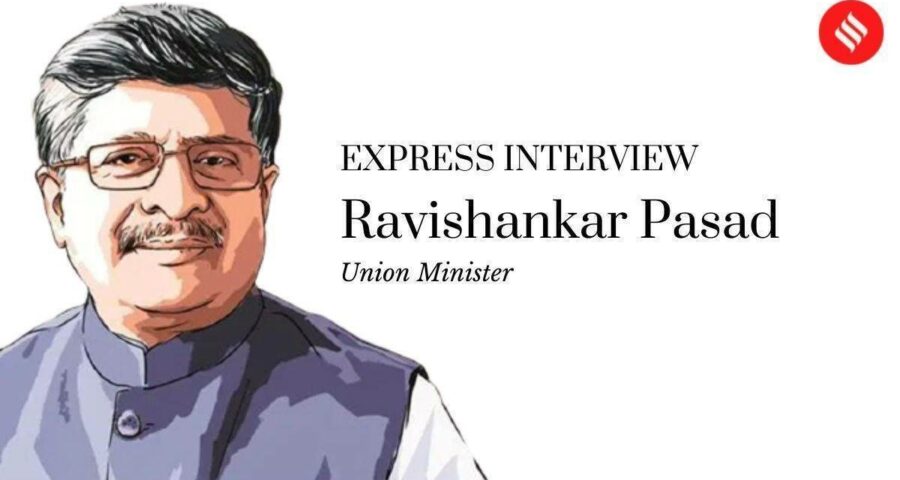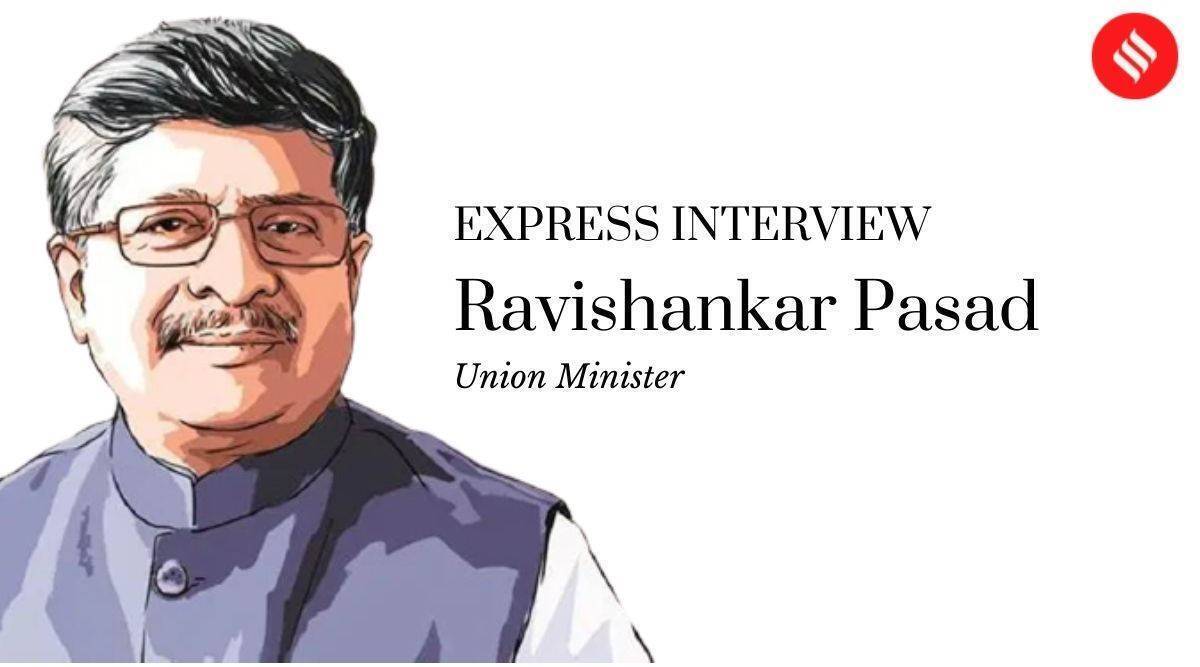In an exclusive interview with The Indian Express, Union Information Technology Minister Ravi Shankar Prasad shares details of consultations that happened on rules, the need to access some “limited” data and castigates intermediaries for their “double standards”.
Any changes in rules governing the internet ecosystem are a subject of intense scrutiny and debate. The guidelines for social media intermediaries, called Intermediary Guidelines and Digital Media Ethics Code, are no exception. In an exclusive interview with The Indian Express, Union Information Technology Minister Ravi Shankar Prasad shares details of consultations that happened on rules, the need to access some “limited” data and castigates intermediaries for their “double standards”. Edited excerpts:
There are allegations that consultations were not held, and that the new IT rules have been sprung all of a sudden.
These guidelines did not appear suddenly. There were court orders on the same and Parliamentary committees have deliberated on the issue. There is a Supreme Court order of September 24, 2019, which very categorically says that various messages and content being shared and spread on platforms, run by intermediaries, are harmful and can spread violence. The court has noted that social media has become a source of large amount of pornography, drugs, weapons and other contraband. And it is due to these specific circumstances that it is imperative that there is a properly framed regime to find out the persons, institutions or bodies who are the originators of such content or messages.
Secondly, there was a calling attention motion in Rajya Sabha on fake news. In consultations, we received 171 comments from individuals, civil societies, industry associations and organisations and 80 counter-comments. So there was wide consultation.
Why do intermediaries still claim not being heard?
I have no comments to make on what they say. I have just facts to state to you.
Is there a lack of engagement with the government? Intermediaries are making statements, challenging rules on the last day.
I cannot prevent them from making a statement. But certainly it is a very curious case that they (WhatsApp) waited till the last date. We are only asking them (social media intermediaries) to give ordinary users voice, a redressal mechanism to the victims of abuse and misuse of social media. We will not do anything. Let them do everything. Social media intermediaries earn good revenue here. Some of them have the biggest user base in India. But for grievance, you ask users to come to America. It is not only surprising, but shows a kind of a wavering in the commitment to the users. The second thing we have noticed is their reluctance to appear before Indian Parliamentary committees. They can appear before American Congress. Even the owners of these platforms appear before Senate committees and House of Commons, but not here. They are welcome to do business in India, but they will have to follow the laws and Constitution of India.
Both WhatsApp and Twitter allege the IT rules as an attack on the privacy of users…
Our commitment to privacy is unimpeachable. Are they permitting free flow of speech and expression by not obeying the mandate of India’s Constitution and following self-made unilateral regulations? They decide this content will go, this will not, or this account will be closed and this will be not.
Our track record of upholding democratic values is too well known to them. But if you have double standard for India vis-à-vis other big countries, this is plainly not acceptable. The issue is of digital sovereignty of India.
Twitter said Delhi Police going to their office was “intimidation tactic”.
Delhi Police has already clarified. Under penal laws of India, it is the duty of everyone to assist in an investigation. It is a statutory obligation. Beyond this, I do not have anything to say because the matter is being handled by police. How can they say they will not join the investigation? If you are a platform, then the obligation of laws of India will have to be followed.
They have also said they are concerned about requirement of chief compliance officer?
Does it require a big infrastructure to establish a good grievance redressal officer based in India whose name is in circulation? Does it require a UPSC selection to have a nodal officer or a compliance officer? Why are you reluctant not to set up a good office with a grievance redressal mechanism?
This reluctance to give a forum to the aggrieved voice of the users by itself raises a lot of disturbing questions. I would go to the extent of saying that they ought to have come up with this on their own.
External Affairs Minister S Jaishankar was in the US on a diplomatic mission when all of this unravelled. Do you think it could have been avoided?
His programme was fixed. A foreign minister will keep visiting foreign countries. There is no linkage. We are fair and reasonable in our demands. We go by the concerns of India. What is relevant is your (Twitter’s) obligation to your own users, in which you failed.
Social media companies had 90 days to comply. They did not. Was there no communication in between?
They had simply asked for a 6-month extension. There has to be some basis for requesting for extension. We were very fair. We gave them 3 months time. Is that not enough for them? So many foreign entities are operating in India, doing business, other operations. Do they not have a proper grievance redressal mechanism?
Does this call for a Sebi-like regulator then for social media companies?
It is not a question for discussion today at least. Do we interfere in social media on a daily basis? We do not and we do not wish to. We want to give them (social media intermediaries) full autonomy and we have and, therefore, their business is rising so high.
Source: Read Full Article


